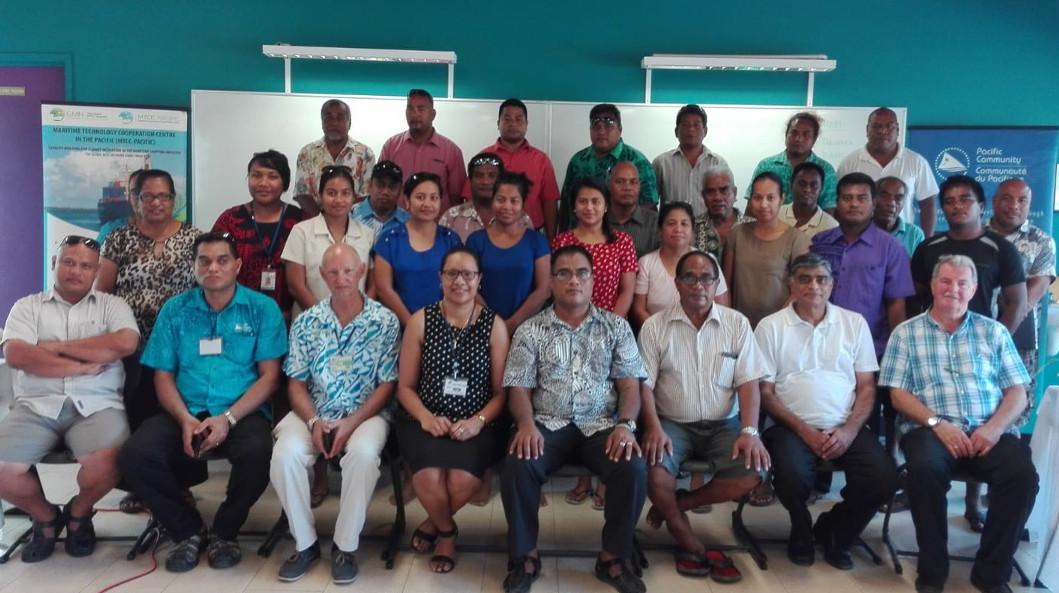Government agencies and domestic shipping operators agreed to practice ship safety and energy efficient operations in the maritime sector at the conclusion of the four-day workshop on safe and energy efficient operation of ships held in Tarawa, Kiribati from 19-22 June 2018 in a joint collaboration of the Pacific Island Domestic Ship Safety project in conjunction with the Maritime Technology Cooperation Centre in the Pacific (MTCC-Pacific) project.
Kiribati covers 811 square kilometres consisting of 20 inhabited islands with a population of 113,000 people, 44.3% in urban and 55.7% in rural areas. The vast sea area is serviced by more than 56 registered vessels providing domestic services between the islands making the reliability, safety and efficiency of maritime transport an absolute priority. Domestic shipping services are the only, and most affordable means of transportation to provide connectivity between islands that support the socio-economic needs of communities.
The Acting Officer in Charge of the Ministry of Information, Communications, Transport and Tourism Development (MICTTD) and Director of Marine, Capt. Ruoikabuti Tioon, welcomed the Pacific Community (SPC) team and added that “the maritime transport sector is vital for Kiribati and it is important for Kiribati to take advantage of the safety and ship energy efficiency operations (SEEO) workshops and build capacity for climate mitigation. I thank MTCC-Pacific for coming here and hope they will continue to provide this kind of training to inform and educate technical staff in Kiribati.”
Mrs. Tiantaake Mariana, the interim President of the newly established Kiribati Women in Maritime Association (KWIMA) expressed her deep appreciation to SPC and participants attending the workshop and for recognising the role of women as resource and stakeholder partners in the shipping industry. Representatives from the Marine Department, Kiribati Port Authority (KPA), Kiribati Oil Company (KOIL) and Maritime Police were also present in this four-day event.
The training and workshop discussions revealed that profitability was the main driver for energy efficiency. Improving ship energy efficiency can improve profitability but maritime regulations on ship energy efficiency management plan (SEEMP) can also accelerate the speed of implementation.
SPC’s Ship Safety Audit Adviser, Capt. Omirete Tabureka, reiterated the need for the ship operators to adopt the Safe Operations Plan (SOP) integrated with the Ship Energy Efficiency Management Plan (SEEMP) for safe and efficient sea transportation in saying that “sea transportation is essential for the livelihood of the people living on the outer islands and the ship owners and captains have to take charge to provide a reliable, safe and energy efficient service.”
MTCC-Pacific is part of the Global MTCC Network (GMN), a project implemented by the International Maritime Organization (IMO), and funded by the European Union, to build the capacity of developing countries for climate mitigation in the maritime industry and thereby contributing to Kiribati’s Nationally Determined Contributions (NDC) and broader Sustainable Development Goals.
During the next week, MTCC-Pacific will follow in the footsteps of the PIDSS program and together work with ships under the PIDSS program to develop safe (SOP) and efficient (SEEMP) shipping. This is critical to ensure that ships are operating safely by adopting the best available and appropriate safe management practices and thereby make it easier to adopt complementary energy efficient operations.
Media contacts:
Mohammed Asid Zullah, Maritime Industry Energy Efficiency Officer, [email protected] or +679 337 9634
Omirete Tabureka, SPC Ship Safety Audit Advisor, [email protected] or +679 337 9341
Lore Croker, Administration and Information Assistant, [email protected] or +679 337 9255
Useful links:
